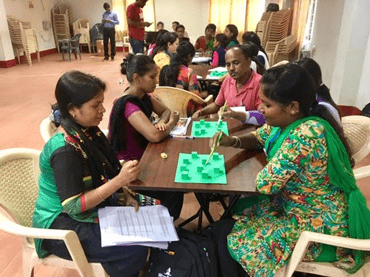Background: In India, over half of women of reproductive age have anemia. Anemia affects both work capacity and productivity. Therefore, reducing anemia could reduce gender wage gaps and women’s economic livelihood. In pregnant women, anemia can also lead to increased risk of premature birth, low birth weight, and maternal mortality. Iron deficiency during pregnancy and early childhood causes permanent reductions in children’s cognitive capacity and socio-emotional functioning that can impact their productive capacity across the life course. The RANI Project, is testing a novel approach to reduce anemia in Odisha, India. We are rolling out a social norms-based intervention that is trying to make taking iron folic acid a normative behavior in all women of reproductive age. Currently, only pregnant women take it but often only intermittently. To evaluate the intervention, we are conducting a cluster-randomized controlled trial. For the baseline data collection, I traveled solo from Washington D.C. to Bhubaneswar, India to help train over 100 team members from our data collection team. This was quite an involved training. In addition to hemocue testing (a finger blood prick) to test for anemia, we are also collecting 4,000 survey responses, taking height and weight measurements, testing cognitive abilities, and assessing physical activity changes. Anemia may affect all of these areas, so we want to monitor them during all three data collection waves.
Tuesday, July 16th – The Red Cross building in Bhubaneswar, Odisha
Cognitive testing day. Soumik, our local partner and Technical Advisor, discussed why we’re conducting cognitive tests, which we are simply calling “games” with the participants. He explained that anemia affects cognitive abilities so we want to measure and compare differences in the treatment versus control group over the course of the one-year intervention. He showed the team how to conduct the Simple Reaction Time Test and the Simon task on the computer. We also created physical boards for the Corsi block test and chose simple words for the word span test (two computer tests and two manual tests in case women feel uncomfortable using a computer). I practiced both manual tests with Soumik and Manoj, our research partners, in English and then they trained everyone in Oriya, the official language in the whole state of Odisha. It would have been too confusing to add English words into the mix. I was happy to help because most other days I’m just observing and our data collection partners are leading the show. All day was dedicated to learning and practicing these four tests “games.” They had fun doing them. Overall, the team is bright and brightly clad in kurtis. The Red Cross training rooms are big with AC and a steady stream of chai and biscuits. They keep trying not to let me see the kitchen, but today I went in and it’s pretty rustic with shirtless men stirring huge pots of daal and making chapati for all of the groups that eat at the canteen. The food is delicious and mostly vegetarian to respect the different goddess days where people chose to forego meat as a sign of respect to a particular god or goddess.


